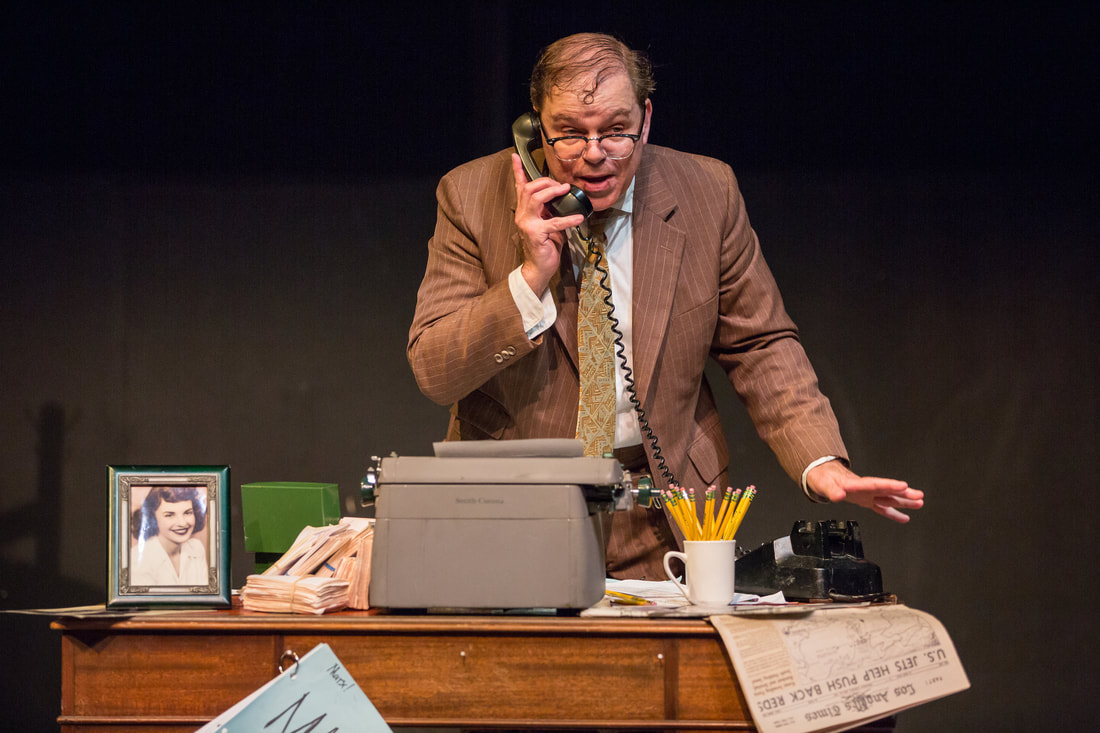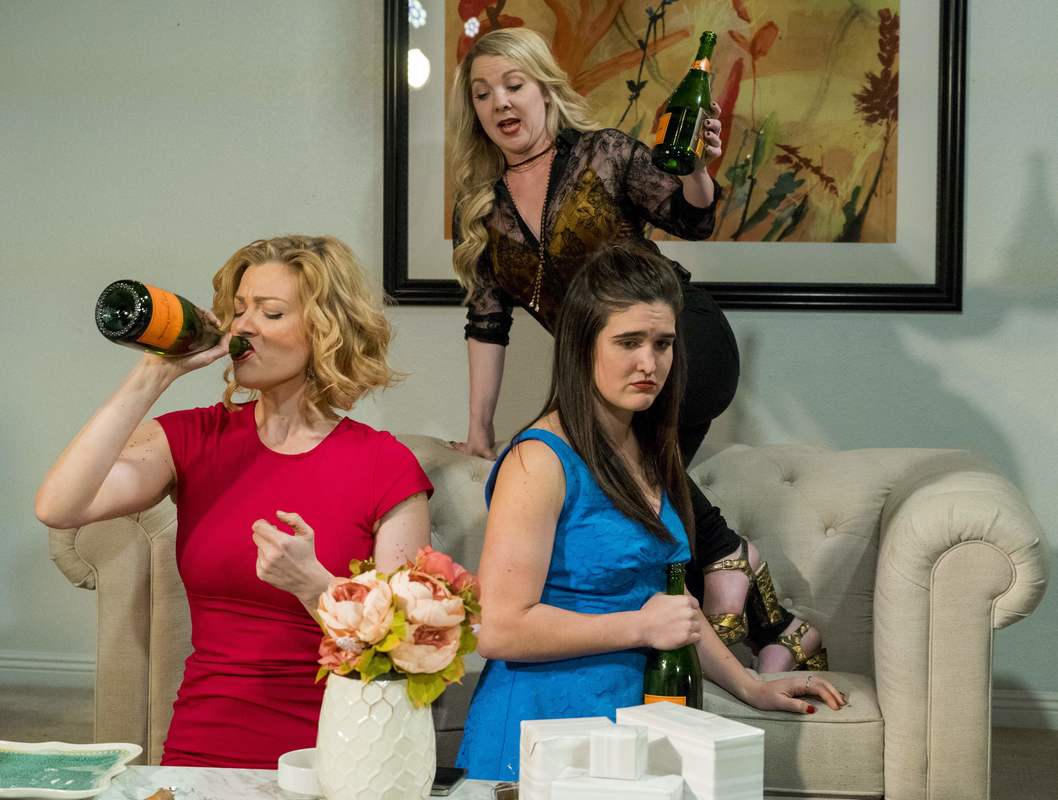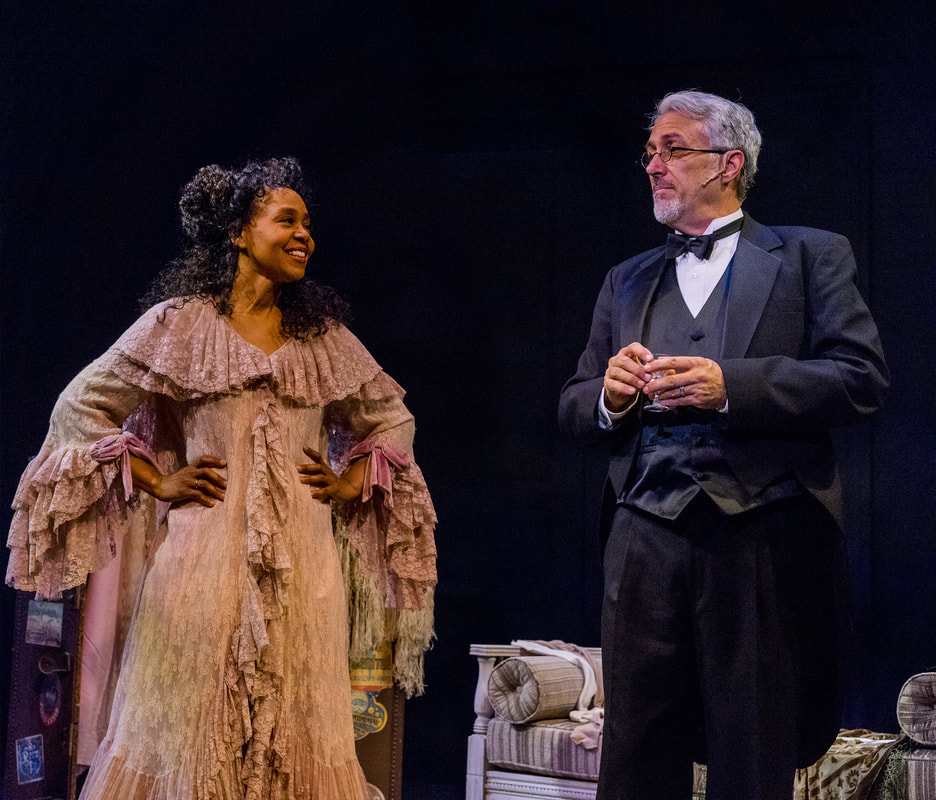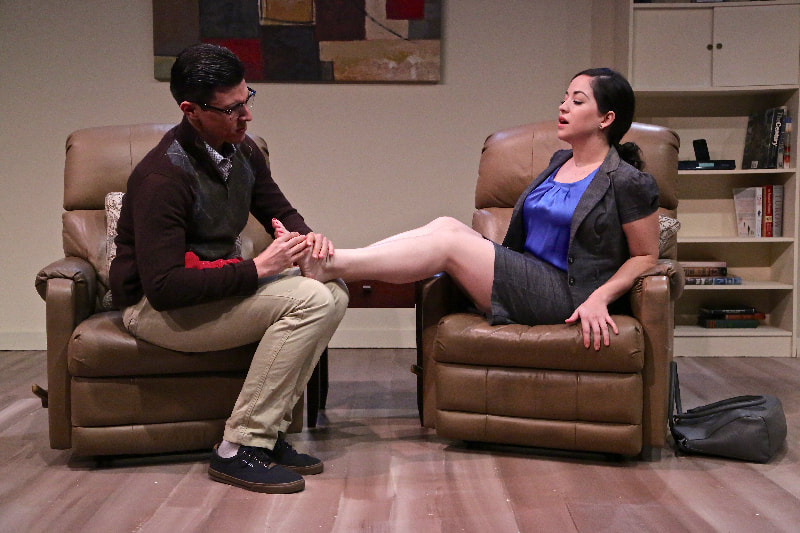|
Skewering Disneyland, the self-proclaimed “Happiest Place on Earth,” is reaching for low-hanging fruit. It’s been done over and over, and the Mouse still roars. In his solo show The Happiest Place on Earth, Chicago playwright Philip Dawkins certainly dwells on the ironies and incongruities of the now-63-year-old theme park, but he doesn’t bury the Magic Kingdom in loud satire or snidery. Yes, Dawkins’ script points out that at Disneyland, a post-ride vomiting episode is referred to as a “protein spill,” that the mess is cleaned up with “pixie dust” and that employees are instructed to never respond to a question with “No” or “I don’t know” but with the bright, shiny and hope-filled “I’ll find out!” But the Disneyland of Dawkins’ play is the backdrop for his mostly affectionate reminiscences about his family and his reflections on their coping with grief and with wishes that didn’t come true, whether wished upon a star or not.
Diversionary Theatre is presenting the West Coast premiere of The Happiest Place on Earth, directed by Jonathan L. Green, who shepherded this play three years ago in Chicago with Dawkins telling his own story on stage. At Diversionary, Dawkins is portrayed by Jacque Wilke, an actress immensely gifted when it comes to voices, mannerisms and portraying characters young and old. That makes her a natural for The Happiest Place on Earth, in which over the course of an hour and a half she becomes everyone from Dawkins’ grandmother to his own mother as a little girl to the theme-park’s Cinderella who greets and smiles for photos with the kiddies. The play explores through Wilke’s storytelling and images shown via an overhead projector the Dawkins family’s perseverance after the sudden death of its patriarch. They turn to Disneyland for succor and distraction, a fantasy land indeed where the outside world does not intrude. There are a lot of names and back stories to keep track of, and Dawkins’ ultimate question about whether true happiness is even possible feels heavy-handed. At the same time, however, Wilke is a thoroughly engaging performer who owns the Diversionary stage and makes this short trip to Disneyland a most memorable one. (Review originally published in San Diego CityBeat on 3/28-18.)
0 Comments
Phil Johnson stars in the one-man show "A Jewish Joke." Photograph by Eric Woolsey. A manual typewriter, a rotary telephone and file cards of “Jewish jokes” stacked high on the desk. That’s all that long-suffering screenwriter Bernie Lutz has for company just hours away from the biggest night of his life: the Hollywood premiere of a movie written by him and his partner, Morris Frumsky. His and the absent Morris’ tuxedos await in zipped garment bags, but before Bernie can change clothes and meet his destiny, his little office at MGM Studios begins to close in on him.
So does the scourge of the 1950: the House Un-American Activities Committee. Marni Freedman and Phil Johnson’s one-man show A Jewish Joke, starring Johnson as the fictitious Bernie Lutz, is a telling reminder of the infamous era of Joe McCarthy, the Hollywood Blacklist, and the “pinko-commie”-seeking witch hunt that tried to, and in many cases succeeded, in ruining careers and lives. A Jewish Joke was conceived a few years ago in the Lawrence Family Jewish Community Center’s 5-Minute Play Festival. Now a one-act production, it is slated to open Off Broadway early in 2019. For now, A Jewish Joke is kicking off the Roustabouts Theatre Company’s second season. Johnson is one of the Roustabouts’ founders, along with actor/director/writer Ruff Yeager and playwright Will Cooper. The play, directed by David Ellenstein, who is artistic director of North Coast Repertory Theatre, has already toured regionally in cities including Chicago and St. Louis. The weightiness of its re-creation of a shameful, paranoid chapter in American history is undeniable. But A Jewish Joke is the product of Johnson’s anguished portrayal of a mensch who’s fought for every little victory in life, and done so with no more than his punch lines and an unflagging refusal to quit. For 90 minutes Bernie frantically works the phone trying to save his and Morris’ dream when he learns that his partner is not only a Communist sympathizer but an organizer. When he is asked to turn in Morris as a means of saving his own career, Bernie must fight again – with his conscience. Johnson is indefatigable and heart rending. He somehow manages to wring laughs, too, from the obvious one-liners that Bernie resorts to as he feels his world slipping away. (Review originally published in San Diego CityBeat on 3/21/18.) Left to right: Rin Ehlers Sheldon, Lauren King and Kay Marian McNellen in "Bachelorette." Photo by Daren Scott Very much to its credit, the raucous black comedy “Bachelorette” is neither cautionary nor apologetic. The best known work in Leslye Headland’s play cycle based on the seven deadly sins (it was made into a 2012 movie starring Kirsten Dunst), “Bachelorette’s” theme is gluttony: voracious appetite for drugs (pot and cocaine), booze (champagne), and sex (last names optional). The excess comes with consequences, yet its wedding-eve practitioners simply are who they are. They party. They bond. They snipe. They survive. But they don’t preach.
Backyard Renaissance Theatre Company is staging the local premiere of “Bachelorette” in the little Black Box space behind University Heights’ Diversionary Theatre. Except for the seating area, every square inch has been transformed into a Manhattan hotel room, smartly designed by Justin Humphres. The posh environs quickly become the setting for a nightlong free-for-all. The bride’s maid of honor, Regan (Rin Ehlers Sheldon), has recruited Gena (Lauren King) and Katie (Kay Marian McNellen), both of them expressly not invited to the next day’s wedding, to get down and par-tay in the hotel room. Gena snorts cocaine like it’s about to vanish from circulation. Katie trashes herself and the suite with equal abandon. No choir girl herself, Regan happily boozes and toots, but she has her “limits”: “I never smoke pot,” she tells the others. “It’s too pedestrian.” Not long after the wedding gown of bride-to-be Becky (Samantha Vesco, appearing late in the going) ends up being a casualty of the debauchery, two outsiders enter the fray. Jeff (Alex Guzman), a player in every sense of the word, and the good-hearted Joe (Graham Ehlers Sheldon) are there to bed Regan and Katie, respectively. In the parallel seduction scene that ensues, it’s hard to tell who’s seducing who, which in its ingenuity reflects the sharpness of Headland’s way with dialogue. When one of the liaisons goes full train wreck, “Bachelorette’s” story darkens, though to great relief, other than the cloying use of Joni Mitchell’s “Both Sides Now” it does not sink into bathos. Directed indulgently by Anthony Methvin, the high-energy cast has license to forsake all restraint. The completely un-self-conscious McNellen in particular takes advantage, but then her self-destructive Katie is written as being just about out of control. In the role of the narcissistic but by comparison composed Regan, Rin Ehlers Sheldon effectively taps into her character’s emotional complexities. Her own mini-meltdown, which follows a fit of meanness, is the play’s most believable reaction to circumstances gone drastically awry. “Bachelorette” is loud, sometimes shrill and it unfolds throughout in an atmosphere of chaos. Its women behaving badly are amusing up to the point where they become near-caricatures and whatever insights the play is trying to impart about reckless self-indulgence or even addiction are lost in the din of slamming doors, profanity and plastic pill bottles hitting the floor. Then again, this is a dark comedy in which the wanton decadence is best left to speak for itself, and to be guiltily enjoyed. (Review originally published in The San Diego Union-Tribune on March 20.) Karole Foreman and Sean Murray in "A Little Night Music." Photograph by Daren Scott For those hopeless romantics who’ve dreamed of waltzing seemingly without end, there is A Little Night Music. Stephen Sondheim’s 1973 musical (with a book by Hugh Wheeler and based on the 1955 Ingmar Bergman film “Smiles of a Summer Night”) is composed largely in three-quarter time. The story’s players at love and longing exist in a world in which there is a rhythm to life, not only to its acquiescence to growing older but its youthful pursuit of the embraceable.
Artistic Director Sean Murray’s first production when his formerly Rolando-based Cygnet Theatre moved into its Old Town space 10 years ago was A Little Night Music. Coming full circle, Cygnet is again staging Sondheim’s musically complex work, with Murray directing and once more occupying the principal male role of Frederik Egerman. Karole Foreman, last seen at Cygnet in 2016’s Stupid F—king Bird, is faded performer Desiree Armfeldt, the true love of Frederik’s life. A Little Night Music is best known for “Send in the Clowns,” arguably the most poignant song Sondheim has written. Its performance – by Foreman midway through Act II, then later reprised in a tender exchange between Foreman and Murray – is indeed the high point of a score that is by turns studied and operatic. The elaborate ensemble numbers, including the opening “Night Waltz” and the first-act-culminating “A Weekend in the Country” are more reflective of the show’s tonality. Murray has enlisted a prodigious cast. Standout performances are delivered by Sandy Campbell as the wry spouse of a foppish, philandering dragoon (David S. Humphrey), by Anise Ritchie as Desiree’s mother with a past, and by Murray himself, perhaps picking up where he left off a decade ago. This is a lengthy show (should it have been “A Lot of Night Music”?), and its second act, when all the lovers and schemers congregate for that titular weekend in the country, boasts the majority of the memorable sequences. A Little Night Music is elegantly costumed (by Jeanne Reith) and choreographed (by David Brannen), however, and like Shakespeare’s enchanted forest trifles, it is charming from start to finish. (Review originally published in San Diego CityBeat on 3/14/18.) Daniel Sosa-Porter and Andrea Acuna in "Spike Heels." Photo courtesy of Onstage Playhouse Everyone in Theresa Rebeck’s Spike Heels seems to have a foot fetish. Or at least a shoe fetish. But there’s really nothing kinky about this play from the early ‘90s that is the penultimate production of OnStage Playhouse’s 2017-’18 season. This full-throated comedy, directed in Chula Vista by Charley Miller, does traffic in smirk and sex, but if not for the f-bombs sprayed by the story’s main character, Georgie, Spike Heels could be considered no more provocative than a musty “Sex and the City” episode.
That being said, there is a piquancy in the revival of Spike Heels today, in the Me-Too era. Georgie is a woman who is and too long has been exploited by men, both in and out of the workplace. She may be brash and profane by inclination, but Georgie is damaged, and it doesn’t take even a half-hour into the play to understand why. Put bluntly, the men of Spike Heels are heels, and Georgie’s boss, Edward, is worse than that (which ultimately results in a puzzler of a denouement). Rebeck seems to be about trying to empower Georgie in the two-and-a-half hours of alternating teasing and yelling, but the script is hindered by sudden shifts in tone and attitude, and by character inconsistencies, too. Onstage’s cast, however, navigates these narrative bumps smoothly. Andrea Acuna revs the full throttle of emotion as Georgie, though she lays the requisite Boston accent on thickly. (Why does no one else in the Boston-set play have an accent at all?) As salacious, immoral Edward, Mauricio Vetaci somehow elicits laughter and even a few moments of sympathy, undeserved for the predatory Edward as those might be. Neither Georgie’s downstairs Svengali, Andrew (Daniel Sosa-Porter) or Andrew’s uptight fiancé, Lydia (Samantha Schmidt) gives the audience much to like about them, though Sosa-Porter effects neurosis with fidgety aplomb. pike Heels runs through April 7. |
AuthorDavid L. Coddon is a Southern California theater critic. Archives
July 2024
Categories |
David Coddon |
|



